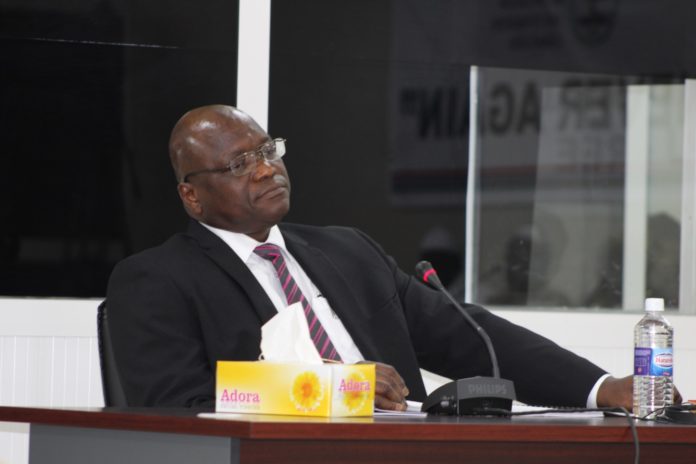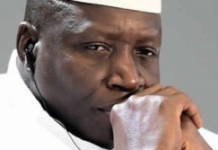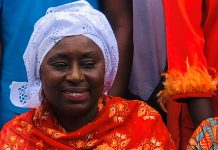By Yankuba Jallow
Ex-Regimental Sergeant Major of the Gambia National Army (GNA) has on Tuesday the 19th February 2019, whilst testifying before the TRRC testified on the role played by Nigerians in the success of the July 1994 coup d’état.
Jeng is the 18th witness of the ongoing Truth, Reconciliation and Reparations Commission (TRRC).
RSM Baboucar Malick Jeng said he was born on the 28th March 1963 and enlisted in the GNA in the year 1983. He said the role of an RSM includes the discipline and welfare of all soldiers starting from the rank of a recruit, private soldier, lance corporal, corporal, sergeant, staff sergeant, warrant officer class 2 and all warrant officer class 1.
He said at this time, there was an insurgency in the Casamance Region of Senegal and the Senegalese army commander recommended that he would change plan. The witness told the Commission that 47 of them were identified and taken to training courses in Senegal. He said in February 1984, they went to Kaolack in Senegal for the first training titled Certificate Aptitude Number 1.
He said during the training, they ran out of stock such as soap, toothbrush and many others. He added that they used to share soap. He stated that they also ran out of stationery because they were using cartoons to write their notes. He said they were not provided with dictionaries to translate the French Language to the English Language; however, the witness said there were 2 of the Senegalese Generals who out of their generosity provided them with a dictionary.
He said they (the Gambian soldiers) wanted to meet the Senegalese authorities to explain to them their plight but were denied access by the Senegalese soldiers who told them that they cannot see the authorities. He said when Colonel Ndow Njie and the army paymaster came to Senegal to pay them, they were paid in dalasi currency instead of CFA which pose a problem for them. He said at this time, some of the Gambian soldiers intimated they will return to the Gambia because they had trained enough.
He said the first phase of the training was for 6 months and they were supposed to be accorded the rank of corporal but this didn’t materialize. He said after completing the second phase they were supposed to be accorded the rank of sergeant but that also did not materialize. He said the British Army Training Team (BATT) was reluctant to accord them the Sergeant rank and he was deployed as an instructor at the training school. He said in 1985, he went on 3-month training in the UK.
On the first mutiny by the soldiers, these were the soldiers who came from Liberia and were not paid their dues by the government. He explained that these soldiers were least appeased with that and they embarked on a mutiny.
“They were not armed,” the witness said.
He said they were received by the then Secretary-General adding that Colonel Ndow Njie, the then army commander was present at the time they met President Jawara for a discussion about the issue. He said President Jawara was furious about why the soldiers weren’t paid their dues.
The witness told the Commission that he was the one who ordered the soldiers to wait for him at the football field in the Yundum Barracks. He said the ring leaders were identified and the soldiers were disciplined while some were dismissed.
He said after this mutiny, Colonel Ndow Njie resigned from the services.
“I listened to the proceedings of the Commission and some of the witnesses told the Commission that Colonel Ndow Njie was dismissed from the army. This is a blatant lie. He was not sacked, instead he resigned base on principle,” the witness stated.
He said the reason why Ndow Njie resigned was that; a Gambian army major by the name Omar Faye who was deployed to Liberia under the ECOMOG returned without authority and notice to the camp in Liberia. RSM Jeng said Major Faye was subsequently dismissed from the Army and reinstated without the notice of Ndow Njie, who was the army commander.
“This was a time when politicians and civilians started interfering in the army and based on this principle, Ndow Njie resigned from the army,” he said.
He said Major Momodou Gaye took over the command of the army for a period and Major Maba Jobe then succeeded him.
He said when the 2nd ECOMOG contingent from Liberia came back to the Gambia; he said they also embarked on a mutiny with the same demands as that of the 1st Contingent. He said the ring leaders were remanded at Mile II and a court-martial was instituted where some of the soldiers were dismissed. He said the 2nd mutiny found him in the UK undergoing a treatment. He said the commander of the army; Major Maba Jobe was redeployed to foreign services to the Gambian Embassy in the UK. Whilst in the UK, he said Major Jobe told him that the Nigerian soldiers have taken over command of the Gambian army instead of providing training for the Gambian soldiers. He said Major Jobe was in disagreement with the NATAG and this resulted to his resignation.
He told the Commission that the first 20 top brass of the army were Nigerians and all Battalions were headed by Nigerians.
His Problems with the Nigerian Soldiers
He said whilst in the UK, General Ibrahim Dada, the then commander of the army and head of the NATAG received a letter that warned him to be cautious and know how to treat the Gambian soldiers. The witness said General Dada attributed the author of the letter to him. He said this was the start of his problems with the NATAG command. He said when he returned to the Gambia, he found out that the letter was written by Captain Momodou Sonko.
“This letter set me and the NATAG soldiers apart,” he said.
He said he came back to the Gambia from the UK in January 1993. He said after a few days, he came to the defense headquarters; he had a problem with Colonel Salieu of the NATAG. He explained that he shared a foul language with the Colonel.
He said he was the most senior RSM in the army and he was not supposed to be moved from the headquarters. He said due to the perception the Nigerian soldiers had about him, they decided to transfer him to Farafenni which according to the witness was not normal. He said at this time, he refused but the then vice president and Minister of Defense, Saikou Sabally asked him to go to Farafenni.
“I was surprised with the Vice President’s involvement because deployment of RSM in the army has nothing to do with him,” he said.
He said at the defence headquarters, there was a Nigerian RSM. He further said after his deployment to Farafenni, he was ordered not to come to the Greater Banjul without an order from the Defense Headquarters. He told the Commission that in the army, any soldier can obtain permission from their unit.
He told the Commission that whilst at Farafenni he tried to bring back proper regimentation and discipline at the Barracks. He said at the time of his deployment at Farafenni, he was not provided with a uniform and a place of accommodation, adding that it was Captain Abdoulie Conteh who used to lend him a camouflage uniform and shared a room with him. He said when he requested to be allocated a room, Colonel Salieu wanted to give him a room in the midst of Sergeants and Corporals but he refused to take that room. He said there was an instruction from the defence headquarters that he should live next to where the Nigerian RSM used to live.
He expounded that there was a day when the keys to the armory were taken away without any person signing for them. He said the keys were later found in the possession of a Nigerian non-commissioned officer who couldn’t give tangible reasons for that. He said when the armory was opened, they found life ammunitions placed on the floor and whereas some in open boxes.
He said there was a day when a Nigerian soldier by the name Sergeant Galaba confessed to him that he and Sergeant Injitita were attached to him (the witness) by the NATAG command to monitor his movements. He said Galaba showed him his weapon filled with live bullets that were purposely to monitor him in case he does anything stupid.
He said in early 1994, the new Army Commander was Colonel Guadebe who requested him to join him at the defence headquarters. He said this was a time when General Ibrahim Dada’s tenure in the Gambia ended and he was requested by his country to go back but he was reluctant to go.
“This posed a problem in the command of the army because General Dada had a lot of influence within the army,” he said.
The witness alleged that the presence of General Dada in the Gambia led the country into the coup. The witness adduced that General Dada had a hand in the July 1994 coup d’état.
Rumours about the coup
According to the witness, there were several rumours about coups in the country both within the army and the gendarmerie. He said one Corporal Mofa Jammeh; a member of the Engineering Squad of the GNA was accused of leaking a coup in Brikama. The witness said this officer used to frequently report to Major Maman and Kebba Ceesay, the then Director General of the National Security Services.
He explained that one day whilst in his office, Corporal Jammeh was brought to him and he asked him what he does at the headquarters frequently. The witness said Jammeh responded that he was asked by Major Maman not to talk to him (the witness) about the issue.
“After knowing the issue, I ordered him to go home and focus on his duties,” the witness said.
He said Major Maman came and told him to stay away from the issue because it does not concern him (the witness). He said when he went to Major Maman’s office; he met Kebba Ceesay and Colonel Acoji as well as Major Maman.
“They told me to be careful because it was not my business
He said at this time, Colonel Acoji was an acting commander and they went on visits to army barracks. He said at the Yundum Barracks, they saw a 40-foot container with weapons which were support from China. He said Colonel Acoji ordered that the weapons be transported to the newly constructed armoury. He said the transportation of those weapons was done slowly until the coup occurred.
“The purpose and role of the NATAG were not properly defined to the Gambia soldiers,” he said.
July 1994 coup
He said on the 21st July, he was approached by Colonel Acoji who asked him to go to the airport where the president was supposed to land because there were rumours of a coup. He said before going to the airport, he passed through the Yundum Barracks to check on the situation there. He said at Yundum, he met soldiers in trucks with men who were armed but he asked them to stop and return the weapons to the armoury. He added that he addressed them and inspected their weapons to ensure that all weapons were empty for the guard of honour for the then president. He said at the Yundum Barracks both Lieutenant Yahya Jammeh and Lieutenant Edward Singhateh approached him and asked him if there was no problem ongoing because it was unusual for RSM to be part of a guard of honour.
“None of the soldiers was disarmed at the airport,” he said.
He told the Commission that it was only Lieutenant Yahya Jammeh who had live rounds because he was a military police officer.
“It was normal for military police to have life rounds because he was the head of the military police unit,” he said.
He said at the airport, he told Colonel Acoji to ask Yahya Jammeh to hand over his weapon. The witness said Colonel Acoji then ordered Yahya Jammeh to hand over his weapon to him to which Jammeh complied.
“Don’t try to be a hypocrite as if you don’t know what was happening?” the witness said Jammeh told Colonel Acoji.
The witness told the Commission that it was at this juncture that he cautioned Yahya Jammeh to hand over his weapon if his conscience was clear.
“Yahya Jammeh brushed the hand of the Colonel and handed over the gun to him,” the witness said.
He said he took Jammeh’s weapon to the boot of Colonel Acoji’s vehicle.
“At the time I put Yahya Jammeh’s weapon at the boot of the car, some soldiers on board a truck clapped,” the witness said.
He said thereafter, Yahya Jammeh placed himself at the last line of the parade and he assigned Lang Tombong Tamba to keep an eye on him. He said when president Jawara came, Jammeh saluted him.
“I told the soldiers and the officers to stay until the last dignitary leaves. I went with the soldiers to the Yundum Barracks and supervised the return of the weapons,” he said.
He said at this time, the rumour of coup was intense and he called Colonel Acoji and asked him to give him the elements of the army who want to stage the coup.
“Colonel Acoji told me that I was commanding him instead of receiving command. He was reluctant to mention the names and this was the time I knew he has an idea of the coup plot,” the witness said.
He said General Dada was still in the Gambia during the July 22nd coup d’état.
On the coup day
He said he was stopped at the Denton Bridge from reaching Banjul by Staff Sergeant Alagie Martins and 2 other soldiers. He said these soldiers tried to arrest him but they couldn’t do so. Moments later, he said a vehicle with a number plate GNA 47 which used to provide security to Saihou Sabally, the vice president of the country at the time of the coup arrived. He said Captain Samsideen Sarr and Lang Tombong Tamba were in that vehicle.
He said moments later, Corporal Tumbul Tamba came with few soldiers armed with RPG and machine guns.
“Tumbul Tamba told me they were armed by officers who ordered them to secure the Denton Bridge,” he said.
He said he told Lang Tombong and Sergeant Martin to get reinforcement from Banjul who will join the group headed by Captain Suwareh to ensure that the soldiers do not pass the Bridge.
“They were not interested in what I was telling them,” he said.
He said about 30 minutes later, two trucks loaded with soldiers came to the Bridge and ordered Suwareh and his men to turn the berets and join them.
He said he saw Captain Sonko, Sadibou Hydara, Yahya Jammeh, Edward Singhateh and other officers. He said when he went and met them; Yahya Jammeh told him that they were protesting against the presence of NATAG in the army.
“Yahya Jammeh told me that they sent two sections (less than 20 soldiers) to the Fajara Barracks and they have taken over the Barracks,” the witness adduced.
He said he told them that he was going home and that anyone who needs him would meet him there. He said he was called by Colonel Acoji who asked him to go and stop the soldiers but he rescinded the order. He said he rescinded because whilst with Colonel Acoji and Captain Momar Cham, one of the Nigerian soldiers named Major Adamu told him to leave because he may be assassinated any moment.
He said he left for home and later went to the Yundum Barracks where he was detained for a day. He said at around 2 am Colonel Ndour Cham came for him and drove him to Mile II where he was detained.
RSM Jeng will appear today to continue giving his testimony at 10 am.





















